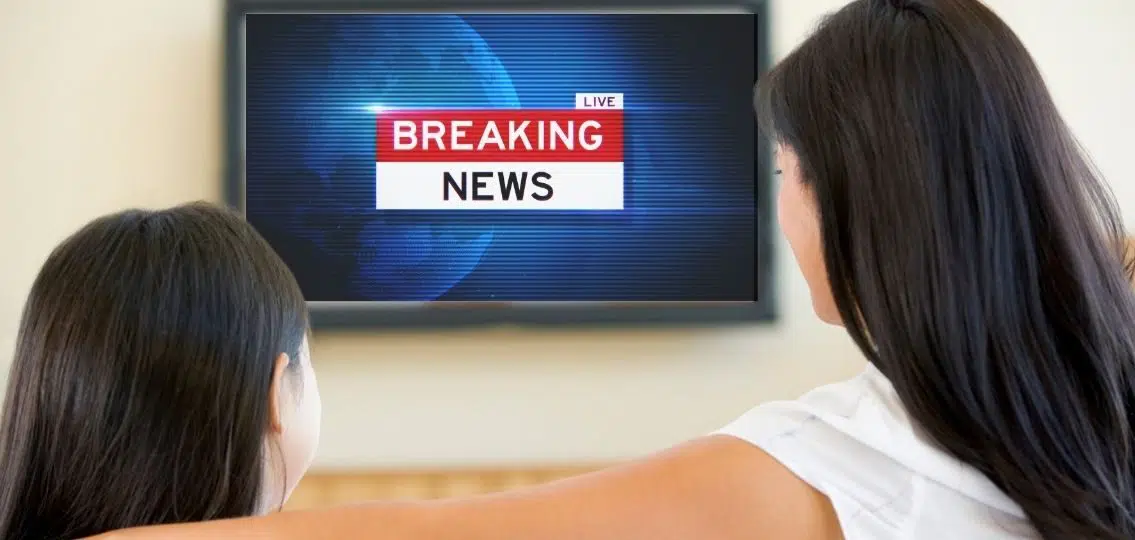“Mom, do you want to hear a joke about Russia?”
This came from my 11-year-old daughter, and when I heard it—an innocent joke where “pootin’” was the punchline—I realized that current events had infiltrated my daughter’s innocent world view.
Even now, I caught her glancing at the Breaking News bar on the television mentioning a recent invasion in the Ukraine. Was she talking to friends at school about the war? What did they tell her? Was their information true? False? Was it harmful? Was she scared? What should I do?
When I was around her age, the OJ Simpson murder trial was the big news rocking the nation. My parents didn’t speak to me about it because they thought it wasn’t relevant in my life. Meanwhile, my peers at school threw around theories like dodgeballs. Any information I got came from their gossip, and it often contained details that I, as an 11-year-old, had no business knowing. It made me worry about celebrities I’d never met and was afraid that something similar might happen to my family. I wanted, more than anything, to know that we’d be safe from the same sort of situation. I want that feeling of security for my daughter, too.
Discussing Turbulent Times
As we began talking about the war in the Ukraine, I discovered that she didn’t know many facts about it. Instead, she had lots of concerns, and many, many questions. So, I tried to answer with what I thought was age-appropriate information. I identified the main players and their primary motivations/concerns. Then I leaned into morality and our family’s values to let her draw her own conclusions about right and wrong.
We wandered into history, treaties, land borders, past political leaders, and prospects for the region’s future. Then she wanted to know what might happen if the United States got involved. The war was halfway around the world, and my tween was worried about our own nation’s safety—and she worried about the safety of our family. What would it mean for us to live in a nation at war?
“Would we have to hide in subway stations like the people in the Ukraine? Or would we flee to another country?” Would we be safe? Would things be normal? She wanted our promise to warn her if we needed to flee. My husband entered our conversation to reassure her we’d all be fine. Meanwhile, I thought about how the same huge concerns furrowing my daughter’s little brow echoed the private concerns my husband and I shared as adults, and it broke my heart.
“When little people are overwhelmed by big emotions, it’s our job to share our calm, not join their chaos.” —L.R. Knost
I was reminded of that quote when my daughter couldn’t answer why she needed us to warn her if she had to flee. She couldn’t answer because her fear had overwhelmed her; her emotions were too large to fit into words. I understood that feeling. I felt the same way during 9/11, when the nation was thrust into an attack that came out of the blue, much like the war in Ukraine must have seemed abruptly sudden to her. Back then, so I didn’t feel hopeless, I moved to D.C. to work for government contractors tasked with supporting our troops in Middle Eastern conflicts, most of which were directly related to 9/11 events. Maybe if I channeled my daughter’s fear into constructive action, I could help her feel like she was helping to make our world better, too?
Becoming a Helper
Like those Polish mothers who left empty strollers at the local train station, my daughter wanted to start helping those in need, and so we looked into ways she could. We talked about the importance of prayer, and of funding and providing materials to organizations actively helping people in Ukraine, like UNICEF, Project HOPE, and Doctors Without Borders. We talked about how some adults show their support for the Ukrainian people through tweets condemning the attacks (#StopRussia and #StandWithUkraine). And we talked about people writing letters to the President asking him to help.
This conversation wasn’t easy. It’s hard to steer clear of horrifying details when you’re talking about war. But even in those moments where I was nervous and unsure, I encouraged my daughter to talk about the issues she was wrestling with, and I provided her with basic-level political science information, plus my own moral and ethical values, because it seemed like a very good place to start.
I know as my tween grows older and more independent, she’ll seek information from other sources to inform her own opinions. Right now, though, I want to establish her understanding early on that she can talk to me about anything. I want her to know I’m a haven for information, someone she can trust to give her straight facts and help her find answers to hard questions, especially when tough conversations turn from general world affairs to topics closer-to-home. I want her to continue to reach out to me when she’s worried, and I hope she learns that when things go sideways, she can use her big emotions as inspiration for being the kind of person who helps out.
